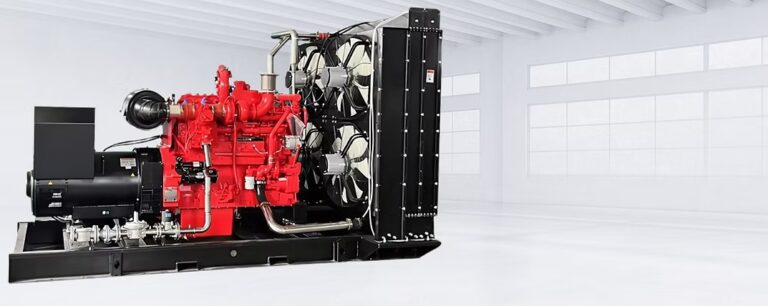Cummins Natural Gas Generators vs Diesel – Cost & Efficiency Comparison

Choosing between Cummins Natural Gas Generators vs Diesel models involves considering efficiency, installation, operating costs, environmental impact, and long-term value. Whether evaluating a Cummins industrial power generator for heavy duty use or performing a backup generator cost comparison for emergencies, the trade-offs between fuel types shape the best fit for your needs.

Fuel Efficiency: Natural Gas vs Diesel Performance
Diesel engines excel in fuel-to-power conversion, thanks to their high energy density—around triple that of natural gas. This allows diesel generators to operate longer on less fuel, and sustain heavy loads more efficiently. They typically achieve thermal efficiencies around 40%, particularly under optimal load conditions.
Natural gas generators, while slightly less efficient in energy conversion—often in the range of 30–40%—compensate with cleaner combustion and more predictable fuel pricing. In areas with reliable pipeline infrastructure, they can offer competitive performance and lower running costs when compared on efficiency and resource availability.
Installation & Infrastructure Considerations
Installation for natural gas generators involves hooking into existing utility gas systems and meeting safety requirements. That can increase upfront complexity and cost. Diesel units, meanwhile, require secure fuel storage and periodic deliveries, adding ongoing operational logistics.
In a built environment with existing infrastructure, installing Cummins Natural Gas Generators can be streamlined and cost-effective. Conversely, for remote or industrial sites where fuel delivery is more manageable than gas access, diesel’s self-contained system may offer a simpler solution.
Emissions and Environmental Impact
Emissions are a central differentiator between the two fuels. Natural gas burns cleaner, producing significantly lower levels of nitrogen oxides (NOx), particulate matter, and carbon dioxide. This cleaner profile makes natural gas generators favorable in areas with strict environmental standards or for organizations pursuing sustainability goals.
Diesel generators have made strides in emissions reduction through advanced filters and catalysts. Still, natural gas generally holds the environmental advantage, with quieter and less odorous operation—features especially important in residential or sensitive applications.
Operational and Maintenance Cost Comparison
Diesel engines are durable, mechanically straightforward, and boast widespread maintenance support—often translating to lower repair complexity and predictable service cycles. Their robust design means that diesel backup generator cost comparison often favors remote or heavy-duty scenarios.
Natural gas generators eliminate the need for complex after-treatment systems and fuel storage. Their cleaner burn results in fewer engine residues and potentially fewer service interventions. However, they do require maintenance of ignition systems, spark plugs, and gas delivery components—a trade-off that balances simplicity against slightly higher service frequency.
Total Cost of Ownership: Value Over Time
Over the long term, diesel generators may outperform on cost-per-kilowatt under-intensive use, especially where fuel is affordable and service reliable. Their resilience and lower maintenance complexity make diesel cost-effective in many industrial settings.
Natural gas generators may require a larger upfront investment, but fuel stability and cleaner operation can yield cost advantages over time—particularly in areas with stable gas access and frequent use scenarios. Evaluating the total cost of ownership must include fuel expense trends, maintenance cycles, and reliability metrics.
Fuel Flexibility: Future-Proofing with Hybrid Capabilities
In today’s evolving energy landscape, resilience isn’t just about having backup power—it’s also about adapting to fuel availability and cost fluctuations. Hybrid-capable systems, like those that can toggle between natural gas and diesel, provide invaluable flexibility. Should natural gas supply be disrupted or expensive, users can switch to diesel. Conversely, when gas pricing drops or emissions regulations tighten, natural gas can take over, offering environmental compliance and smoother operation.
This dual-fuel approach minimizes downtime and ensures continuous operation, even under unpredictable conditions. It also allows for smarter fuel management—using the most economical or sustainable option available at any given time. Over time, this living flexibility can yield significant savings and operational confidence, particularly in scenarios where fuel reliability is critical.
By choosing a system capable of both natural gas and diesel operation, you’re not only securing power for today—you’re preparing for tomorrow’s demands.
Ideal Use Cases and Application Scenarios
Fitness for purpose determines best fit:
- Urban or compliance-focused sites benefit from Cummins Natural Gas Generators, which offer clean, discreet, and seamless energy integration.
- Remote or rugged environments favor diesel for its self-sufficient fuel storage and simpler operation.
- Hybrid or critical applications—such as hospitals or microgrids—may require both: natural gas for day-to-day operations and diesel for emergency reliability.
Conclusion
Comparing Cummins Natural Gas Generators vs Diesel is not a one-size-fits-all decision. Diesel offers proven efficiency, fuel independence, and resilience where autonomy matters most. Natural gas brings clean combustion, cost-filtered stability, and environmental alignment—especially in urban or regulated zones.
Think through your infrastructure, operational needs, environmental factors, and cost objectives. With Cummins, you can tailor a reliable, efficient generator solution that meets performance and financial goals today and into the future.

One Response